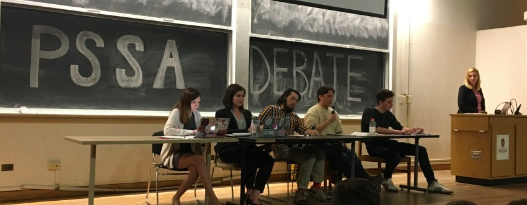In an effort to continue the national debate surrounding gun control, the University of Wisconsin Political Science Student Association hosted a panel Sunday evening to discuss the issue with students from a variety of political affiliations.
The panel consisted of Abby Streu from Young Americans for Freedom, Bailey LaSage from College Republicans, David Pelikan from College Democrats, Andrew Stein from Young Americans for Liberty and Scot McCullough from International Socialist Organization. The previously planned Our Wisconsin Revolution speaker was unable to attend the panel, so Dombroe and Pelikan were allowed more responses for a more balanced debate.
The panelists discussed gun control broadly, but mainly focused on possible solutions for gun violence in the United States.
For the most part, Streu, LaSage and Stein advocated for less gun control and regulation, while McCullough and Pelikan advocated for more regulation.
Pelikan said while he does respect the wishes of those who support their Second Amendment right, he also wants “common sense” gun reform, such as background checks, to reduce rates of gun violence.
The debate of mental health has been at the forefront of the gun control debate around the country. On this issue, the panel held a variety of views.
Streu expressed support for mental health checks, but was concerned about the possible legislative limitations that could be placed on those with mental illness that could possibly strip them of their rights. LaSage echoed similar views, bringing up the concern of criminalizing those with mental illness.
“Background checks are great conceptually, we don’t want people with a violent pasts who have been criminals or who are mentally unstable to have firearms,” Streu said.
McCullough, however, said part of the problem with gun violence is blaming those that are mentally ill and they should not be stripped of their rights due to their illness.
Stein agreed with McCullough regarding stripping those with mental illness of their rights, adding that the due process rights with mental health checks just do not exist.
“As long as gun ownership remains a constitutional right which U.S. citizens have, I don’t think there’s any reason why mental illnesses should be stripped of this right,” McCullough said.
The National Rifle Association has also been a main topic of the recent gun control debate because many Republican legislators receive donations from the NRA. Pelikan said this is one reason it will be difficult for Republican and Democratic lawmakers to reach a compromise on gun control.
LaSage and Streu, both NRA members, pointed out the fact that only 8 percent of the NRA’s budget goes toward advocacy, such as funding candidates and lobbying, while the other 92 percent goes toward other expenses such as funding gun safety courses and training. This figure was drawn from the book “Shall Not Be Infringed: The New Assaults on Your Second Amendment” by David Keene, a former NRA president.
“Yes, the NRA does give funding to candidates, but they give on behalf of their members,” Streu said. “I’d also like to point out that unions and Planned Parenthood do that as well.”
The March for Our Lives student protestors were supported by the panelists for exercising their First Amendment rights, but there was variance regarding how the issue of school shootings, and gun violence more broadly, should be handled on the legislative level.
Pelikan said these student protestors are a large part of the reason the gun control debate is so prominent right now.
“One of the most exciting things about it is how the [students] who have been organizing have been making very real efforts to connect the shooting in Parkland to all the other forms of gun violence,” McCullough said.
Correction: A previous version of this article incorrectly stated that Stein and Pelikan advocated for more regulation. McCullough and Pelikan advocated for more regulation. The Badger Herald regrets this error.


